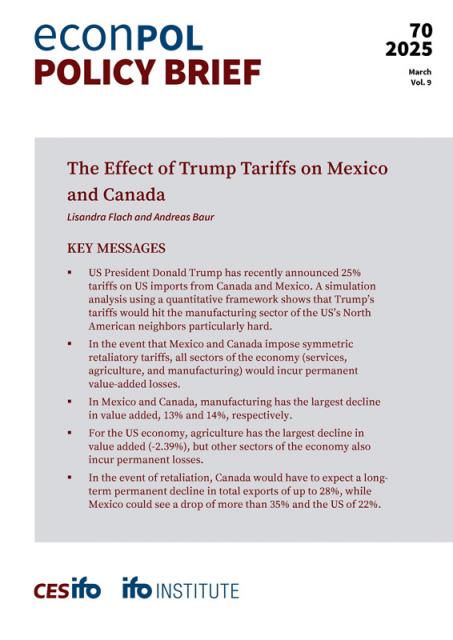News Archive

EconPol Newsletter: Geoeconomics and the Green Transition
|
Newsletter
| News
The last EconPol Newsletter of 2023 has just been published. This issue features a special Policy Report on Geoeconomics analyzing different scenarios for the EU's future trade policy, a review of our 2023 EconPol Annual Conference in Brussels, as well as the latest EconPol Forum on how to make the green transition finally happen.

Trade Policy Scenarios for Europe's Economy
|
Polilcy Report
| News
Recent events and rising geopolitical tensions have raised concerns about the external dependence and vulnerability of Europe’s economy. A division of the global economy into geopolitical blocs would hit European pharmaceutical manufacturers, automotive manufacturers and suppliers, and manufacturers of machinery and equipment particularly hard. This is the finding of a new EconPol Policy Report.

How to Make the Green Transition Happen?
|
EconPol Forum
| News
The devastating effects of climate change are becoming increasingly evident. It is difficult to accurately predict or even quantify the risks. Despite this threat, the pace of change is slow. Why is the world failing to tackle this problem collectively and effectively? What constraints are holding us back? How can we overcome them and contribute to the formulation of a credible and acceptable climate policy? What policy instruments can help pave the way to the green transition?

EconPol Europe Annual Conference 2023: Geoeconomics – New Challenges for Europe
|
Event
| News

EconPol Newsletter: Geoeconomics – New Challenges for Europe
|
Newsletter
| News
Now published: The new issue of the EconPol Newsletter for September and October 2023. It includes: a new Policy Brief analyzing skills within the German and European automotive industry; a new Expert Opinion discussing the conflict between economic growth and ecological sustainability; and the latest issue of EconPol Forum which deals with the question on the future of the EU Single Market on the occasion of its 30th anniversary. You will also find a preview of our conferences in Brussels in November.
